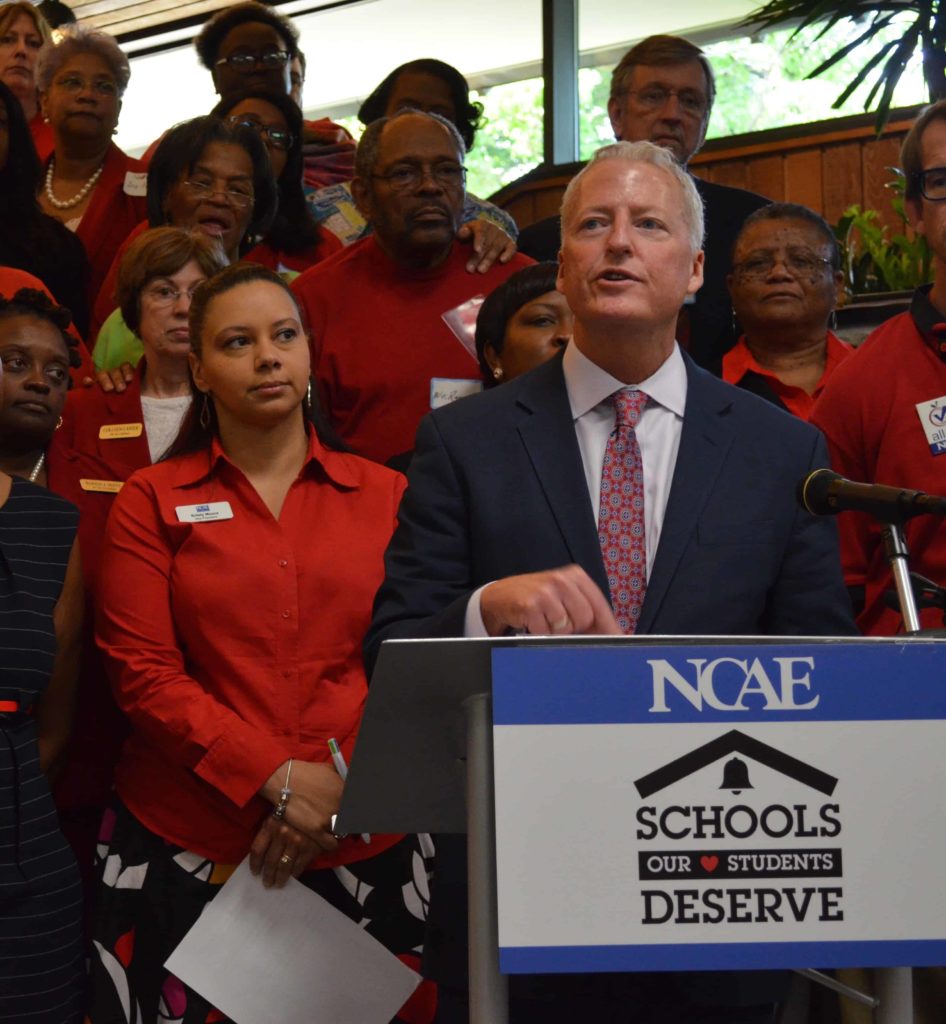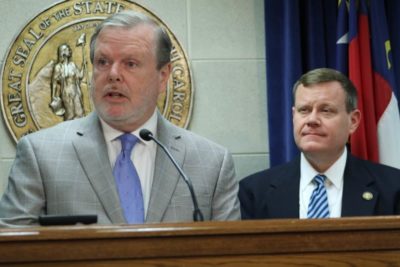Advocates for rural North Carolina and education descended on the General Assembly this week.
On Tuesday, the North Carolina Rural Center held its first Rural Day, where advocates heard from state political leadership before moving to the legislature to meet directly with lawmakers.
Among the speakers were Senate President Pro Tempore Phil Berger, R-Rockingham, and Governor Roy Cooper, both of whom expressed their support for rural North Carolina.
Berger called his districts a microcosm of North Carolina. Representing both Rockingham and Guilford counties, Berger’s districts include both rural and more urban parts of the state.
“I’m here to … affirm that rural communities and rural counties in North Carolina are the backbone of this state,” Berger said.
He went on to list some of the things that the Republican-led General Assembly has done over the past six years that he said have helped rural North Carolinians.
He listed tax cuts on the income tax, corporate income tax, gas tax and the elimination of the death tax as some of the benefits rural residents have gained from the leadership of his party.
“North Carolina now has the best tax climate in the region, the 11th best in the entire country, a significant improvement over 2011 when we were 44th in the nation,” he said.
He also added that under Republican leadership, the state has a budget surplus of $580 million this year, and he said the state has increased public education funding by more than $1.5 billion in the past six years.
Cooper led his speech with a narrative about growing up on a farm in rural North Carolina where he said his family and friends still live.
“It’s part of me. Nash County will always be in my soul,” he said, adding later, “I grew up understanding what life is like and how wonderful it can be to live there.”
He said that when he talks to CEOs and companies about the rural parts of the state, he talks about the peace, serenity and values of the people there.
While he said he has hit the ground running as governor with job creation in different parts of the state, the devastation of Hurricane Matthew in eastern North Carolina was foremost in his mind.
“We cannot forget it,” he said. “We have to continue to work hard to step up to help our friends and neighbors there.”
But Cooper said there was something good that came from Hurricane Matthew.
“The something good is that Hurricane Matthew put a spotlight on problems that have already been there,” he said.
He noted that the state became more aware of the need for affordable housing, good-paying jobs, and better infrastructure in rural areas of North Carolina.
Rural Day occurred prior to the release of the Senate budget proposal.

On Wednesday, prior to heading to the General Assembly to meet with lawmakers, education advocates gathered at the North Carolina Association of Educators building and held a press conference to state their priorities.
The group, calling themselves the Schools Our Students Deserve Coalition, discussed just-released national rankings from the National Association of Educators which show North Carolina to be 43rd in the nation this year for per-pupil spending, down from the 2016 final ranking of 42. The projected number for this year is $8,940, down from $8,955 last year.
“The Rankings and Estimates of States released this morning by the National Education Association once again show a disturbing trend in North Carolina,” said Mark Jewell, president of the NCAE.
He called on the General Assembly to raise per-pupil spending at least to the national average, which it is currently more than $3,000 less than the average.
Jewell said the Republican-led General Assembly has not invested well in education, and praised Governor Roy Cooper’s budget proposal as showing a more visionary plan for K-12 students than that found in the Senate’s budget proposal.
The group also spoke about the recent House Bill 13 compromise which spares schools from losing some enhancement teachers, like those that teach arts, physical education, and music.
The compromise delays class size restrictions by a year, and the Senate budget states it intent to fund enhancement teachers after those restrictions go into place but offers no number.
“Let’s make no mistake about it. House Bill 13 was temporary, short-term, stop-gap measure,” Jewell said. “We are urging our lawmakers to assure funding for these critical and core positions like art and music and PE and world languages. Educators shouldn’t live year to year in fear of losing their jobs.”
Sen. Joyce Waddell, D-Mecklenburg, spoke at the press conference, criticizing the Senate’s budget plan for teacher pay increases.
“I am disappointed that the Senate did not do what it needed to do when it comes to teacher pay increases,” she said. “The Senate didn’t do what it needed to do. And it can do better in a state like this.”
The Senate budget includes raises that will lead to an average 3.7 percent raise this year and 9.5 percent raise over the biennium for teachers. However, starting pay for teachers would stay at $35,000 and teachers with 25 years of experience or more would receive no raise.
Waddell also criticized the Senate’s proposed budget for eliminating health insurance for teachers when they retire. This would apply only to newly-hired teachers.
“We’ve got to think of the teachers who are teaching now, to make teaching not a job, but a career,” she said.
The press conference at the NCAE happened at the same time that the Senate was scheduled to hold an appropriations meeting to discuss the budget. The Senate pressed to move the budget through various committees Wednesday ahead of consideration by the full Senate today.
Recommended reading




